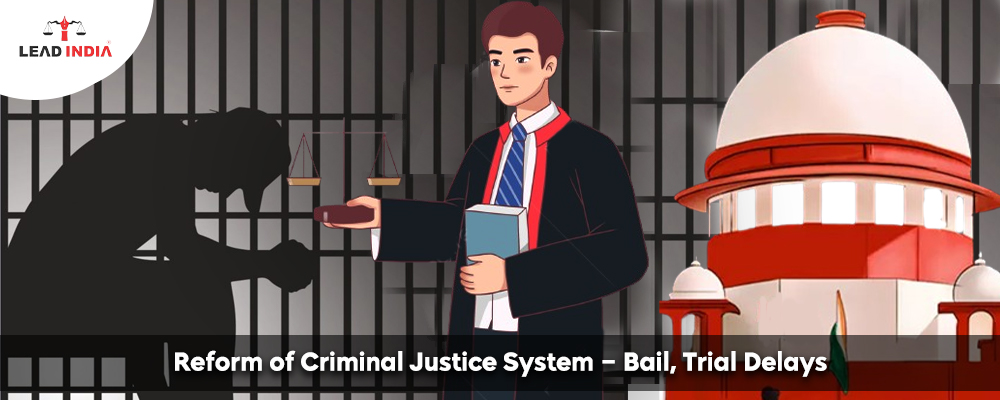Under bail, an accused person in a criminal case is temporarily released from custody while the court renders a decision. The amount of money deposited to guarantee the accused person’s release is referred to as “bail.”
Need for Reform in Bail provisions
In a recent ruling in Satender Kumar Antil v. CBI, the Indian Supreme Court highlighted the shortcomings of the country’s bail system and how they contributed to the current situation. Despite repeated directions about bail law, the Court observed that little has changed in practice.
The Court gave detailed instructions on bail-related laws. This includes emphasizing the necessity of passing separate legislation and imposing deadlines for the processing of bail applications. The ruling stated that the “presumption of innocence” and that “bail not jail” should be the standard and that overcrowding jails with detainees awaiting trial was against these principles. Still, it is important to consider why these well-established values are respected more when they are broken than when they are followed.
Need A Legal Advice
The internet is not a lawyer and neither are you. Talk to a real lawyer about your legal issue

Obstacles to Bail Compliance
- Due to difficulties adhering to bail requirements, sizable portions of undertrials are still behind bars after being granted bail.
- The main causes of an undertrial’s incapacity to adhere to bail requirements include financial difficulties, lack of assets, and lack of local sureties.
- The ability of an undertrial to adhere to bail requirements is further weakened by elements such as a lack of residency and identification documentation, family abandonment, and difficulties navigating the legal system.
- It is necessary to provide ongoing handholding to ensure that bail requirements are followed and that the largely structurally disadvantaged undertrials appear in court.
- The current bail law does not consider this important factor when it comes to guaranteeing last-mile justice delivery.
- Research indicates that 14% of undertrials who were granted bail failed to follow the terms of their release, meaning they stayed behind bars.
Trial Delays
One of the primary issues facing the administration is the tardiness with which the court’s ongoing matters are handled. Particularly in India, where delayed justice is not only rejected but also skirted, mocked, and weakens the legal system, the figures for case handling delays are quite high. Union Minister of Law and Justice Kiren Rijiju that as of August 2, 2022, there were 71,411 pending cases in the Supreme Court of India, of which 56,365 were civil matters and 15,076 were criminal matters, recently informed the Rajya Sabha. The occurrence of delays is not unique to India. Issues with tardiness and case resolution are prevalent in numerous other jurisdictions as well. That being said, the Indian legal system’s level of delay is unheard of.
Causes for Delay
- The population of India is growing far more quickly, which affects court delays as well. Growing numbers attract individuals with diverse cultural backgrounds or ideas, which in turn fuels disagreements and frequently results in arguments between them.
- Our judge-to-population ratio is subpar. India lacks enough judges, which shows that the issue is one of quantity and that the result is a delay in justice.
- One additional important factor is that no Act or Code specifies a deadline for handling cases. Taking advantage of this frequently results in parties being taken advantage of in some manner.
Reform of Criminal Justice System: Bharatiya Nagarik Suraksha Sanhita
- Exclusion of Crimes Carrying a Life Sentence: One important exception to this rule is for those who are accused of crimes carrying a life sentence. Those who are accused of a crime carrying the death penalty have not yet been covered by the s. 436A clause. But the proposed Cl. 481 broadens this definition by adding the exclusion of people charged with crimes carrying a life sentence in prison.
- A proviso that specifies that an individual who is a first-time offender (having never been convicted of an offense before) may be freed on bail after serving one-third of the maximum sentence allowed is proposed under Cl. 481, BNSS. For an undertrial who has not been convicted before, this benefit is still a matter of right and is not contingent on any other factors, including the gravity of the offense or judicial discretion.
- A person who is the subject of an ongoing investigation, inquiry, or trial in more than one offense or several cases will not be released on bail by the court, according to subclause (2) of Cl.481 BNSS, an amendment to the current requirements under s.436A CrPC. This subclause keeps a certain group of people from taking advantage of this provision. This subclause not only directly contradicts the presumption of innocence because it denies anyone the benefit of this section because an investigation, inquiry, or trial is still ongoing, but it also presents several other issues.
The new criminal law has provisions for reform in criminal law. It has provisions for under-trial prisoners which will be of great benefit. Lead India provides free legal advice and online information among other legal services. We offer a platform where you can talk with a lawyer and ask legal questions. Lead India’s lawyers can help you with any legal matters. Lead India offers free online legal help in India. In addition to providing legal advice online, Lead India allows users to ask professionals questions for free.



